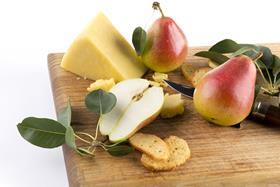
There’s a division among pear consumers: those that like a crunch and crisp bite, and those that prefer the buttery soft texture of a traditional pear.
“There are two very distinct segmentations in pear market around texture,” explained Garry Langford, manager of Apple & Pear Australia’s (APAL) Intellectual Property Division. “There are a portion that like crisp pears, while some prefer that traditional buttery texture.”
In a category often seen as stagnant compared to its faster-moving cousin the apple, there are few new pears that have hit the market in the past few years.
Two new pear varieties are being trialled in Australia, with the industry body hoping the visually appealing pears with a high eating quality will catch the attention of consumers in domestic and overseas markets.
ANP 0118, to be marketed as Lanya, is an early variety, red-blushed pear harvested around the end of January, or early February, with a crisp crunch and juicy, sweet flavour that’s ready to eat when picked.
ANP 0131, to be marketed as Deliza, is a more traditional, European-style pear that requires conditioning once picked, with a buttery texture. This larger sized pear is red-blushed as well and picked around early March.
Langford explained that APAL won the bid to evaluate the commercialisation potential of these pears in 2008, with six companies now testing the pears – one in Western Australia, one in South Australia and four companies in Victoria.
APAL is the licensee of Agriculture Victoria Services, which has ownership of the pear cultivars and associated IP.
Commercialisation is still a season or two away, but Langford says consumer feedback from tastings has been positive, with the red-blushed appearance of both pears standing out.
While both pears have the potential to be exported, Langford says they initially weren’t sure of ANP 0118 storage capabilities, particularly in retaining its flavour.
“Since testing the pears in the past two years, we’ve found that both the flavour and crispness are still good, even after three months in storage,” Langford explained.
ANP 0131 also shows great export potential with storage capabilities similar to Packham pears, which can hold for up to six months.
Langford said the commercialisation and licensing of the two trademarked pears will be similar to that of APAL’s global Pink Lady business structure.



